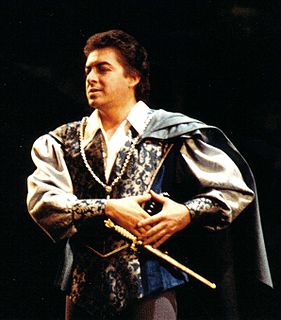Related Research Articles
A tenor is a type of classical male singing voice whose vocal range lies between the countertenor and baritone voice types. It is the highest male chest voice type. The tenor's vocal range extends up to C5. The low extreme for tenors is widely defined to be B2, though some roles include an A♭2 (two A♭s below middle C). At the highest extreme, some tenors can sing up to the second F above middle C (F5). The tenor voice type is generally divided into the leggero tenor, lyric tenor, spinto tenor, dramatic tenor, heldentenor, and tenor buffo or spieltenor.

Idomeneo, re di Creta ossia Ilia e Idamante is an Italian language opera seria by Wolfgang Amadeus Mozart. The libretto was adapted by Giambattista Varesco from a French text by Antoine Danchet, based on a 1705 play by Crébillion père, which had been set to music by André Campra as Idoménée in 1712. Mozart and Varesco were commissioned in 1780 by Karl Theodor, Elector of Bavaria for a court carnival. He probably chose the subject, though it may have been Mozart. The work premiered on 29 January 1781 at the Cuvilliés Theatre in Munich, Germany. It is now considered one of the greatest operas of all time.

Friedrich "Fritz" Karl Otto Wunderlich was a German lyric tenor, famed for his singing of the Mozart repertory and various lieder. He died in an accident aged 35.
Robert Tear, CBE was a Welsh tenor singer, teacher and conductor. He first became known singing in the operas of Benjamin Britten in the mid-1960s. From the 1970s until his retirement in 1999 his main operatic base was the Royal Opera House, Covent Garden; he appeared with other opera companies in the UK, mainland Europe, the US and Australia. Generally avoiding the Italian repertoire, which did not suit his voice, Tear became known in leading and character roles in German, British and Russian operas.
Gösta Winbergh was a Swedish tenor.

José Francisco Araiza Andrade, is a Mexican operatic tenor and lied singer who has sung as soloist in leading concert halls and in leading tenor operatic roles in the major opera houses of Europe and North America during the course of a lengthy career. Born in Mexico City, he studied singing at the Conservatorio Nacional de Música de México and later in Germany, with Mozartian tenor Richard Holm, and lieder interpretation with Erik Werba. He made his operatic debut in 1970 in Mexico City as First Prisoner in Beethoven's Fidelio. Araiza initially came to international prominence singing in Mozart and Rossini operas, but in the 1980s broadened his repertoire to include Italian and French lyric tenor roles and Wagnerian roles such as Lohengrin and Walther von Stolzing. He was made a Kammersänger of the Vienna State Opera in 1988. Now retired from the opera stage, he teaches singing and serves on the juries of several international singing competitions.

John Alexander was an American operatic tenor who had a substantial career during the 1950s through the 1980s. He had a longstanding relationship with the Metropolitan Opera in New York City, singing with that company every year between 1961 and 1987 for a total of 379 performances. He also periodically performed at the New York City Opera during his career and was a frequent presence at the Philadelphia Lyric Opera Company during the late 1950s and 1960s. Although he spent most of his career in New York City, Alexander occasionally traveled to perform as a guest artist with many of the world's leading opera houses, both in the United States and Europe. He was also an active concert singer throughout his career.
Walther Ludwig was a German operatic lyric tenor, particularly associated with Mozart roles and Schubert lieder.
Waldemar Kmentt was an Austrian operatic tenor, who was particularly associated with the German repertory, both opera and operetta.

Anton Raaff was a German tenor from Gelsdorf near Bonn.
Vincenzo dal Prato was an Italian soprano castrato singer, famous for his work with Mozart.
Elisabeth ("Lisl") Augusta Wendling, was a German soprano, for whom Mozart wrote the role of Electra in his opera Idomeneo, re di Creta.
William L. Lewis is an American operatic tenor and academic.
William Cochran is a Heldentenor who achieved an international career.

Kobie van Rensburg is a South African tenor and opera director.
Rüdiger Wohlers is a German tenor.
Christian Elsner is a German tenor in opera and concert, and an academic voice teacher at the Hochschule für Musik Karlsruhe. He focused first on lied and oratorio, then entered the opera stage in roles such as Handel's Tabarco and Mozart's Pedrillo. From 2007, he also performed roles such as Wagner's Siegmund and at international opera houses and festivals.
Thomas Mohr is a German operatic tenor and academic voice teacher. He began his career as a baritone, but moved on to heldentenor and has performed roles in all tenor parts of Wagner's Der Ring des Nibelungen at Der Ring in Minden. He has appeared at major international opera houses and concert halls, and made recordings. Mohr is a professor of voice at the Hochschule für Künste Bremen. He also runs an agricultural estate where he founded a music festival.
Josef Protschka is a German operatic tenor who also sang lieder and oratorio and made many recordings. A long-term member of the Cologne Opera, he appeared at international opera houses and festivals, with a focus on Mozart's roles such as Tamino. As an academic voice teacher, he was rector of the Hochschule für Musik und Tanz Köln from 2002 to 2009.
Johannes Chum is an Austrian operatic tenor who has made an international career, first in concert, then in opera. Initially known for historically informed performance of Baroque oratorios and Mozart operatic roles, he has developed a large repertoire which also includes Wagner's Lohengrin and contemporary opera.
References
- ↑ Rudolph Angermüller, 'Die Sänger der Erstaufführung des "Idomeneo" KV366'.
- ↑ Adolf Sandberger, Zeitschrift der Internationalen Musikgesellschaft, vii (1905/6), 66-71.